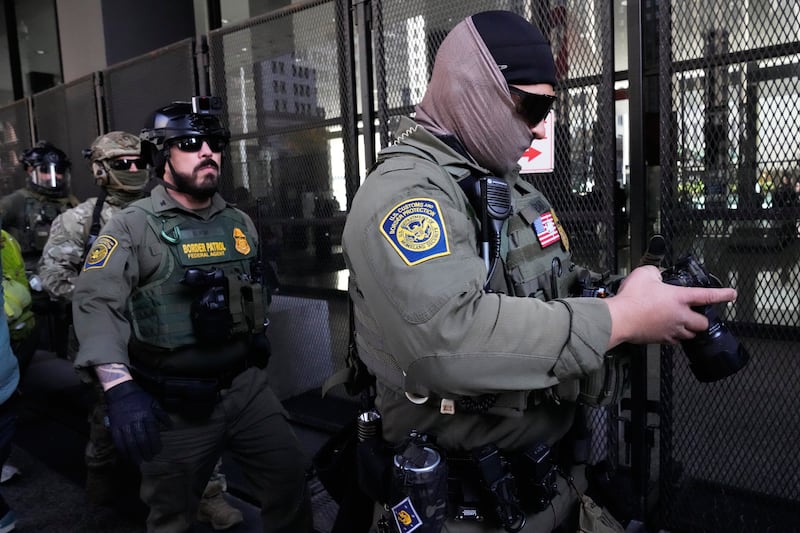SPRINGFIELD – After weeks of verbally condemning the aggressive federal immigration crackdown in the Chicago region, Illinois lawmakers approved legislation banning civil immigration arrests in and around state courthouses early Friday morning.
House Bill 1312, among other provisions, would also allow Illinois residents to sue immigration agents who violate their constitutional right to due process and protection against unreasonable searches and seizures.
It heads to Democratic Gov. JB Pritzker’s desk after clearing the Illinois Senate 40-18 and the Illinois House 75-32 in the waning hours of their annual fall veto session.
“We are standing here because our communities have been living in fear – fear of being separated from their children, fear of being taken from their homes, fear of simply existing,” said state Sen. Celina Villaneuva, D-Chicago. “This bill is about giving people a sense of safety, a sense of humanity, and the assurance that their government sees them and will stand up for them.”
State lawmakers worked behind the scenes for weeks to craft a package to respond to the federal immigration campaign known as “Operation Midway Blitz.”
The Department of Homeland Security claims the operation has resulted in the arrest of more than 1,500 immigrants who were living in Chicago and its suburbs without legal permission over the past seven weeks.
But it also has resulted in violence, with federal agents and protestors repeatedly clashing outside of an Immigration and Customs Enforcement processing facility in suburban Broadview. And, increasingly, masked federal agents have used tear gas and other chemical agents to disperse protests that arise during operations in Chicago neighborhoods.
Many Chicago area lawmakers have had a front-row seat for these actions. State Rep. Hoan Huynh, D-Chicago, said a Border Patrol agent pointed a gun at him last week while he warned residents of Chicago’s Albany Park neighborhood of immigration enforcement activity nearby. A Vietnamese refugee who said his family was on a kill list, Huynh said the tactics the agents use remind him of the authoritarian regime he escaped decades ago.
“We cannot continue to allow gun-toting mercenaries, often without agency badges, to roam our communities and abduct our neighbors,” Huynh said. “Enough is enough. ICE conduct is unacceptable and un-American. If you love the Constitution of the United States, if you love America as much as you say you do, and if you believe in due process, then I urge you to vote yes on this bill.”
House Speaker Emanuel “Chris” Welch, D-Hillside, who sponsored the bill in the House, put the action into historic context, asking his colleagues if they would have supported amendments abolishing slavery or granting women the right to vote if given the opportunity.
“This is our moment,” Welch said. “And history will judge our actions in this moment, just as is did our predecessors. History will remember those who are silent in moments like these.”
Under the bill, civil immigration arrests would be barred inside state courthouses and within a 1,000-foot buffer zone outside of the buildings. Although there had long been a de facto understanding that such were off-limits for immigration enforcement, they have increasingly been the site of apprehensions over the past year. Those who violate the act would face statutory damages of $10,000.
Suing law enforcement agents
The bill also allows Illinois residents to sue immigration agents for violating their constitutional rights. They would be able to collect punitive damages, which can be increased if the agents are wearing a mask, concealing their identity, failing to wear a body camera or using a vehicle with a non-Illinois or obscured license plate.
State Rep. Patrick Windhorst, R-Metropolis, warned that it would have unintended consequences on state and local law enforcement. Law enforcement groups like the Illinois Association of Chiefs of Police and the Illinois Sheriff’s Association cited similar concerns.
“This bill goes too far,” Windhorst said. “It is too broad and there will be grave consequences to our state if it is adopted.”
Proponents suggested this would not impact state and local law enforcement since they are banned from participating in civil immigration enforcement under the state’s TRUST Act.
Senate President Don Harmon, D-Oak Park, characterized it as “an imperfect bill.”
And he acknowledged that lawmakers were “playing with a stacked deck” versus a federal government with the “upper hand” due to the supremacy clause of the U.S. Constitution. And there will be legal pushback.
“This law will be challenged – we know that it will,” Harmon said. “But it doesn’t mean it’s not the right thing to do.”
All Republicans opposed the measure, accusing supermajority Democrats of overreaching to the point where the legislation will not withstand a legal challenge. They also expressed concerns about the legislation impeding the enforcement of the country’s immigration laws.
“We have to stop demonizing people for enforcing the current law,” said state Sen. Neil Anderson, R- Andalusia. “If [you] don’t like the law, change it. But that’s the law.”
Other provisions of the legislation require public colleges and universities, hospitals and child care facilities to set up policies for dealing with immigration enforcement. It would also mostly prohibit them from disclosing the immigration status of students, patients, parents and children. Day care providers and public universities would be required to notify parents and campus communities of immigration enforcement activity.
Capitol News Illinois is a nonprofit, nonpartisan news service that distributes state government coverage to hundreds of news outlets statewide. It is funded primarily by the Illinois Press Foundation and the Robert R. McCormick Foundation.
